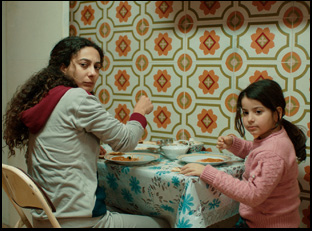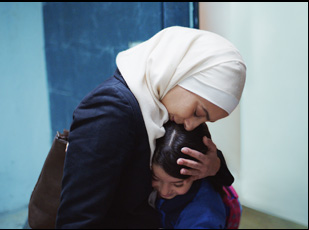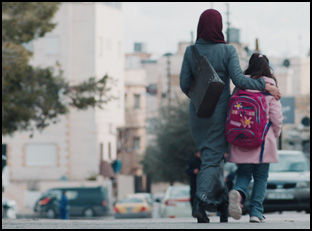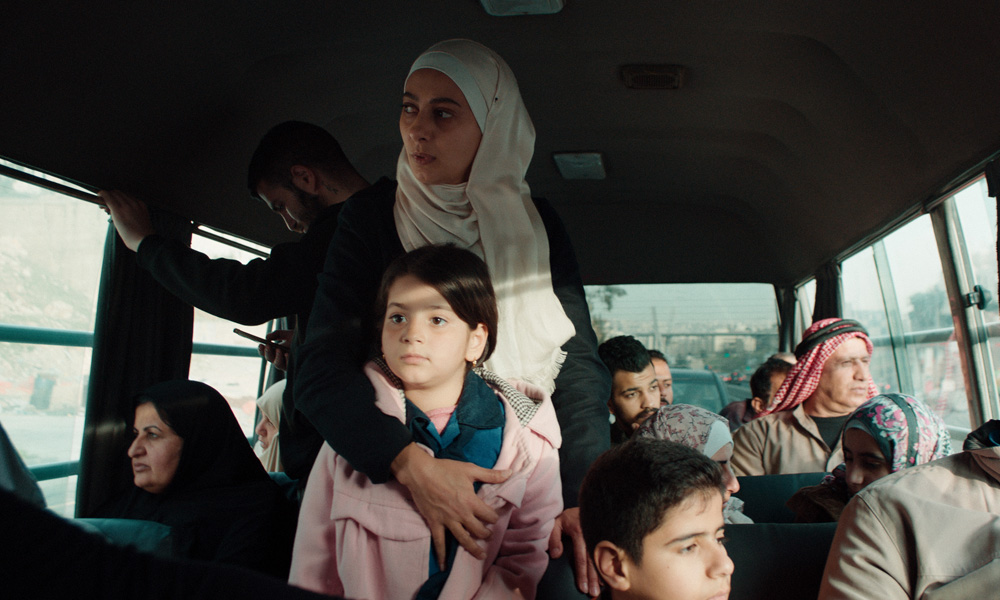There are worse things than to lose your partner for life Nawal (Mouna Hawa) finds in “Inshallah a Boy,” having no time to process the discovery of her husband quietly and unexpectedly passing in his sleep well before his time when immediately she must ensure that she can keep a roof over her head and her daughter Nora (Celina Rabab’a) without him. It isn’t that she needs to find work to afford payments on the place, but in Amjad Al Rasheed’s shrewd and harrowing drama, the threat is coming from inside the house when Nawal’s brother-in-law Rifqi (Hitham Omari) is eager to use laws in their native Jordan that privilege men over women when it comes to the lineage of rights to take ownership when his brother left behind no male heir to assume that responsibility at some point.
Many Jordanians are unaware such laws are even on the books, yet Al Rasheed learned of them when a relative found herself in such an untenable situation and crafted a riveting feature debut from it, following Nawal’s desperate search to avoid homelessness. Her travails ultimately lead her through nearly every corridor in Jordanian society, from the wealthy family who she works for and she shares a common cause with Lauren (Yumna Marwan), one of their daughters who’s trapped in an unhappy marriage that a divorce is no option for, to the humble home of her brother, whose family may be trapped in poverty, but enjoys a certain level of security simply in having a patriarch. Working from a sharply observed script co-written with Rula Nasser and Delphine Agut, Al Rasheed brings to the surface the subtle ways that gender-based laws have shaped women’s experiences without anyone even conscious of them and holding back progress in ways that those who continue to uphold them also fail to see.
It isn’t only inequity that Al Rasheed makes vivid, with “Inshallah a Boy” quite colorful to depict the vibrant every day lives of Jordanians and as dire the situation is at hand, the film is deeply tender at its core when Nawal is driven by her love for her daughter and becomes a propulsive force of nature when exhausting every possibility to keep the deed to her property. The film has already made history as the first film from Jordan selected to premiere at Cannes and subsequently picked by the country to represent it at the Oscars and on the eve of its release in the U.S. this week starting in New York, Al Rasheed graciously took the time to talk about how he developed the gripping drama, working with his cast to achieve such naturalism and telling a story through its intricate use of locations.

After I saw this incident, I started to do research about the common [domestic] situations and to go back in my memory and to remember some situations that happened to women in my life. I was raised in a family full of women, so I always been hearing their stories, and while writing this script, the main question was what are Nawal’s options? What is she going to do in this situation? So we started to create these solutions and one of them —the most crazy —was to get pregnant with what hopefully will be, inshallah, a boy, so that was the way we shaped the events. And at first I struggled [with the right tone] because the the law itself and the situation for me was bizarre and absurd. So I tried at first to deal with it with absurdity. I wanted to do a dark comedy, but it didn’t work. Then I met my producer, Rula Nasser, who pitched a more realistic tone to it while keeping these kind of absurd scenes in the story. So we reshaped the draft I had with more realistic tone and more grounded to reality. Then Delphine came on board and she helped us to shape the structure it in a more realistic way.
The homes say so much about the characters. What was it like to work on the production design for this?
Nasser Zoubid, a Jordanian production designer, was suggested by my producer Rula, and he’s worked on a lot of foreign films and local films, and mainly he’s worked on war films. And at first, I wanted a woman to give it more feminine [feel], but realized because we are living in a male-dominant society, I wanted that to be reflected in the production design. Also what I wanted to was a very realistic, toned-down vigilance that serves the story and I wanted to find locations that are almost ready for the film itself. I don’t want to say it was like a Dogme [95] film, not to that extreme, but as close as I could. For example, we almost did not change a thing for Lauren’s house. It’s mostly set dressing, and most of the locations [were]. Nawal’s house was the only house that was empty. Otherwise, most of the locations were almost ready [to shoot as they were].

There was no involvement of the actors in writing the scenes, but during the rehearsals I tweaked the dialogue with the actors to make it sound more natural and to make sure that they understand what was the purpose of this line. It’s never happened to me that I’ve tailored a script to an actor. I feel like it’s more exciting to find the actor who’s going to do the the character and to try to shape this talent and to motivate and direct the actor to bring the character you’re imagining and I rarely changed anything on set. But I tried during the shooting to choose the scenes [in a certain order] to work out all this chemistry [between the actors] to make this magic, at the beginning of the relationship or at a certain point of the relationship, then another scene when the relationship is changing [particularly] when I knew how the chemistry would be between Mouna Hawa and Yumna Marwan, the actor who played Lauren, or for example, [casting] Eslam Al-Awadi to play the physiotherapist role because there will be this chemistry will be between him and Nawal, so I feel it and I try to work on it and I prepare a lot.
It was interesting to realize that a number of key department heads were from other countries — cinematographer Kaname Onoyama is Japanese while composers Jerry Lane and Andrew Lancaster are from England. Was it interesting to get them in the mix for a Jordanian-based story?
The talent is very important for me, but also to work with people. You spend six years working on an independent film, so when the moment comes and you want to shoot, I decided that I wanted to work with people that believe in the story, people I feel comfortable with, and people that I have a chemistry with, so it was absolutely great to work with Kaname Onoyama. He lives in France and works a lot in Britain and one question I asked him at first, [was about] what he felt he would bring to the story and he immediately told me that what’s happening in the film is not far from his culture, and this is the magic of cinema. Different languages, different colors, different tones, and we’re telling a story that everybody can relate to. It was the same with the British composers. They did a Jordanian film called “Deep” before, and I liked the soundtrack and when I met them, I felt immediately that, “Oh, these are people that I will enjoy working with,” so it was a pleasure to have this collaboration. And on set all the crew except the [cinematographer] were Jordanians, and this is something that I’m very proud of. Our Jordanian crew, each one of them is a storyteller in his or her own department and it was a very nice collaboration with every single one.

It was crazy to start with the biggest festival on the planet in La Semaine de la Critique and I’m so honored to be the first Jordanian film to be in Cannes. And since May, it’s been crazy, hectic and overwhelming with all the emotions I still need to process and understand. We went to TIFF, BFI, Mumbai, and I’m honored and I’m happy, but at the same time it comes with a huge stress of what I’m going to do next and a big responsibility of what type of story I’m going to tell for my next film.
“Inshallah a Boy” will open on January 12th in New York at Film Forum and expand on January 19th to the Mary D. Fisher in Sedona, Arizona, The Tara in Atlanta, the Laemmle Glendale in Los Angeles and the Harkins Shea in Scottsdale, Arizona.




